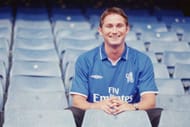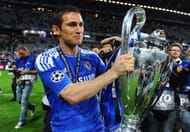Chelsea claimed their fourth Premier League title this season, but it was the first one without Frank Lampard. However, the fans did not forget about the midfield maestro who brought them so many moments of ecstasy throughout a trophy-laden 13-year spell at Stamford Bridge. The Blues supporters continued to bellow the name of their club’s top-scorer, a man who, along with the likes of John Terry and Didier Drogba, epitomised Chelsea’s golden generation.
Even though it was a lighter shade of blue in which Lampard bid the Premier League a fond farewell, the blue of Chelsea’s rivals, Manchester City, there was no ill sentiment for a player who contributed enormously to Chelsea’s greatest ever moments.
From a young age, Lampard was forced to contend with the immense pressure that came naturally with following in the footsteps of his footballing father, Frank Senior, a West Ham legend who made over 500 appearances for the East London club and was capped by England twice. Little did his son know, his relatively modest international haul was set to be exceeded comfortably by a boy who became an expert at harnessing pressure, transforming it into motivation that contributed to his focus as a professional.
That’s part of the reason Lampard has excelled so admirably throughout his entire career. He was, of course, blessed with great talent and natural ability, but his insatiable appetite for self-improvement drove him to levels that surpassed his expectations.
Then again, perhaps nobody really expected that the humble, likable lad from Romford, London would grow to become the greatest goalscoring midfielder the Premier League has ever seen, breaking Bobby Tambling’s record for Chelsea and winning pretty much every major honour there is to win for a Premier League player. He has said that he has always had a fear of failure, but Lampard’s intelligence, commitment to his craft and his determination to succeed ensured that his fears never became reality.
In fact, what did become a reality were the dreams supposedly beyond his wildest imagination growing up, kneeling down on the pitch in Munich, looking to the sky as a Champions League winner with Chelsea.
Beginning at West Ham
Frank was a West Ham fan as a boy, harbouring ambitions to break into their first-team just like his father had done. He made his professional debut for the Hammers in January 1996, after a character-building loan spell at Swansea City in the Second Division, where he managed his first ever professional goal against Brighton. A keen student of the game, Lampard acquired plenty of knowledge and know-how from his time at Swansea, exposed to the ruthlessness of a senior team for the first time when he was just 17.
After he returned to Upton Park, it wasn’t long before he was breaking into the first-team. He sustained a broken leg in March 1997 and went through a reasonably dark spell in his fledgling career, but he was prepared to fight to regain his place under Harry Redknapp at West Ham.
Lampard did have his doubters, most notably a tetchy fan forum when a gentleman asked why Redknapp had let Matt Holland go for ‘peanuts’ and kept Lampard who, according to him, ‘clearly wasn’t good enough.’ Redknapp’s defence was passionate, insisting that the young midfielder would go right to the very top, in a visionary prediction.
Lampard’s belief in his own potential was beginning to wane but he never let the doubters fully infiltrate his mentality. Knowing that Redknapp and his team-mates trusted and believed in him was enough.
In the 98-99 season, Lampard really began to flourish, appearing in every single Premier League game and scoring five goals, helping the Hammers finish impressively in fifth place, and earning a place in the Intertoto Cup.
The following two seasons, Lampard’s reputation blossomed as he continued to grace the West Ham midfield and contribute goals consistently. In the 99-00 season, he scored 14 times and added nine more the following year, which would prove to be his Hammers swansong. Given Lampard’s excellent performances, it was only natural that a big club would come calling and that’s exactly what happened in 2001, when Lampard received a phone call from Chelsea.
The Chelsea story
Considering his love and close family connections with West Ham, saying goodbye was extremely difficult but he knew he had to go, to progress and fully realise his potential. He was signed for £11 million, which was a fairly hefty fee at the time.
Lampard was immediately installed in the first-team by Claudio Ranieri and he played steadily, but without really setting the league alight by his own admission.
During his three years under Ranieri, Lampard continued to develop into one of the most effective attacking midfielders in the league and was a staple in Ranieri’s distinctly international Chelsea side, which included the likes of Eidur Gudjohnsen, Jimmy Floyd Hasselbaink and Marcel Desailly and the expensive imports of Hernan Crespo, Claude Makelele and Adrian Mutu, whose arrival showed new Chelsea owner Roman Abramovich’s title-winning ambition.
It was an exciting time for Lampard, who lined up alongside some of Europe’s greatest talents but it didn’t quite happen under Ranieri. Chelsea finished second behind that ‘Invincible’ Arsenal side in the 03-04 season and reached the semi-finals of the Champions League, but Abramovich was ruthless and knew that Ranieri was not the man to bring Chelsea forward; that man was Jose Mourinho.
It was under the Portuguese ‘Special One’ that Lampard enjoyed inarguably the greatest days of his Chelsea career. Mourinho strolled into the Stamford Bridge dressing room with an aura of arrogance and charisma, and immediately captured the imagination of the players and fans. Lampard came to realise quickly that he was in the presence of a born champion, and a man who would make him a Premier League winner.
In Chelsea’s first gallop to the Premier League title in 04-05, Lampard was yet again ever-present, scoring 19 goals in all competitions and leading the league in assists with sixteen. He was constantly showing his creativity, intelligence and goalscoring prowess and became an essential cog in Mourinho’s unstoppable winning machine. Mourinho’s unshakable self-confidence rubbed off on Lampard, who grew and grew as a player.
Lampard has always had the work ethic and with Mourinho as his new mentor, they formed a special bond that would form the bedrock of a triumphant spell for the club. It was fitting that Lampard scored the two goals in Chelsea’s 2-0 win at the Reebok Stadium over Bolton Wanderers, gifting Chelsea their first league title in 50 years.
The next season, Chelsea were once again untouchable as they romped to a second consecutive league title and it was a season that brought great personal achievement for Lampard, netting a career-high 16 league goals and breaking David James’ record for most consecutive Premier League appearances, in what was a true testament to his staying power and portrayed his indispensability to the Chelsea squad.
Lampard began to gain acclaim from the global footballing community as well, as he finished runner-up to the unmatchable Ronaldinho in the Ballon d’Or and FIFA World Player of the Year awards, while also nabbing a spot in the inaugural FIFPro World XI. Lampard shared a place in midfield alongside Zinedine Zidane in that team; illustrating just how much he was revered by his peers.
When Mourinho left Chelsea in 2007, it was difficult for Lampard, who shared a close bond with the manager. However, Lampard was a consummate professional and stayed with Chelsea, committing himself to helping Chelsea become European champions. Avram Grant stepped in to take charge of Chelsea temporarily after Mourinho left and guided the club to the Champions League final to face Manchester United in Moscow.
Although it was ultimately a harrowing night for Chelsea as a football club, losing on penalties to their rivals in European football’s showpiece, Lampard struck a crucial equaliser in regulation time to force extra-time. It was typical Lampard, arriving with a perfectly timed dash into the box, taking advantage of a deflection and slotting the ball past Edwin van der Saar.
Following Grant’s departure, Chelsea went through an uncertain spell under Luiz Felipe Scolari but did manage to win the FA Cup in 2009 under interim boss Guus Hiddink. When Carlo Ancelotti took charge in the summer of 2009, it marked another wonderfully productive spell for Lampard, when he struck 20 league goals in a season for the first time as an attack-happy Chelsea won the league title back in fine style, ending a three-year spell of dominance from Manchester United.
The Champions League dream
As the managers continued to come and go, including Andre Villas-Boas, who left Chelsea 3-1 down to Napoli in the Champions League last-16. When Villas-Boas was sacked, Roberto di Matteo stepped in and stood up to the task of overcoming the deficit, with Lampard scoring a pressure-cooker penalty at Stamford Bridge in the second-leg.
Once again, Lampard showed nerves of steel as he converted a crucial penalty to eliminate Benfica and advance to the semi-final. After defeating Barcelona in the semi-final Lampard captained Chelsea in the final in John Terry’s absence, assuming the responsibility of the leader on the biggest night of the club’s life. Overcoming the odds against the mighty Bayern Munich, Chelsea won on penalties in what Lampard has described as the greatest night of his footballing life.
It was the ultimate achievement. Lampard had won the holy grail of football while wearing the captain’s armband.
Lampard finally said goodbye to Chelsea in the summer of 2014, after Mourinho revealed the club were going to release him. While it was tough to stomach for Lampard, he handled it with typical class and professionalism. It was announced that he was to move to the MLS with New York City FC, but he would complete a loan spell with Manchester City before heading to the USA.
When the opportunity presented itself, Lampard didn’t believe it was wrong to move to Manchester City. He was driven for one last Premier League experience and he got it at the Etihad Stadium. He scored against Chelsea after coming on as a substitute in the 1-1 draw in September and refused to celebrate, out of respect for Chelsea.
While the brief adventure with City didn’t culminate in further trophies to add to his extensive personal collection, Lampard bowed out in the only way he knew how; by scoring a goal in his final match, in the 2-0 win over Southampton. It was his 177th Premier League goal and one that he will cherish for a long time.
We have said goodbye to many legends of the Premier League this year, most notably Steven Gerrard and Didier Drogba, but Lampard will be missed equally, as his contribution to Chelsea over the years is difficult to measure.
He will always be remembered for his goalscoring exploits, his professionalism and his humility. Lampard has always come across as a genuine human being, an intelligent man who considers others and has great respect and admiration for his peers.
Farewell then, Super Frank. We are unlikely to ever see another midfielder as prolific as you.


